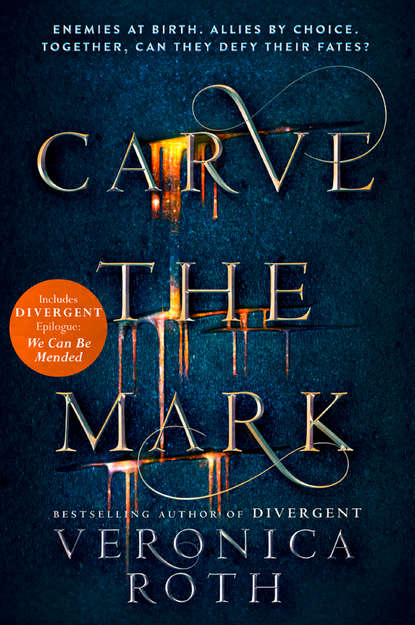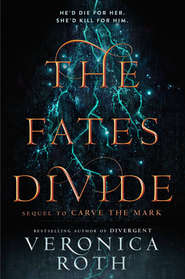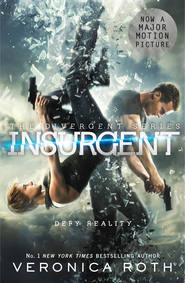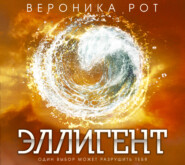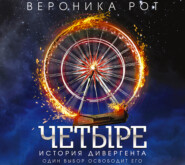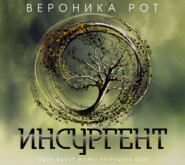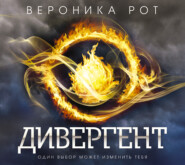По всем вопросам обращайтесь на: info@litportal.ru
(©) 2003-2025.
✖
Carve the Mark
Настройки чтения
Размер шрифта
Высота строк
Поля
“Then stop staring at them and look at your opponent.”
He raised his hand, fist to cheek, then swung at me from the side with the practice blade. I stepped away and turned, fast, smacking him in the ear with the flat of the knife handle. Wincing, he twisted around, trying to stab me when he was off balance. I caught his fist and held on tight, stalling him.
“I already know how to beat you,” I said. “Because you know that I’m better than you are, but you’re still standing right here.” I waved my hand, gesturing to the area right in front of my body. “This area is the part of me that has the most potential to hurt you, the part where all my strikes will have the greatest impact and focus. You need to keep me moving so you can attack outside of this area. Step outside of my right elbow so it’s hard for me to block you. Don’t just stand there, letting me cut you open.”
Instead of making a snide comment back to me, he nodded, and put his hands up again. This time, when I moved to “cut” him, he shuffled out of the way, dodging me. And I smiled a little.
We moved that way for a while, turning circles around each other. And when I noticed that he was breathless, I called him off.
“So tell me about your marks,” I said. My book was still open to the chapter on “Opponent-Centered Strategy,” after all. There was no opponent quite like one you had marked on your arm.
“Why?” He clasped his left wrist. The bandage was gone today, displaying an old kill mark near his elbow—the same one I had seen seasons ago in the Weapons Hall, but it was finished now, stained the color of the marking ritual, a blue so dark it was almost black. There was another mark beside it, still healing. Two slashes on a Thuvhesit boy’s arm. A unique sight.
“Because knowing your enemies is the beginning of strategy,” I said. “And apparently you have already faced some of your enemies, twice-marked as you are.”
He turned his arm away from his body so he could frown at the dashes, and said, like it was a recitation, “The first was one of the men who invaded my home. I killed him while they were dragging my brother and me through the feathergrass.”
“Kalmev,” I said. Kalmev Radix had been one of my brother’s chosen elite, a sojourn captain and a news feed translator—he had spoken four languages, including Thuvhesit.
“You knew him?” Akos said, face contorting a little.
“Yes,” I said. “He was a friend of my parents. I met him when I was a child, and watched his wife cry at the memorial dinner after you killed him.” I cocked my head at the memory. Kalmev had been a hard man, but he kept candies in his pockets. I had watched him sneak them into his mouth during fancy dinners. But I hadn’t mourned his death—he was not, after all, mine to mourn. “What about the second mark?”
“The second …”
He swallowed hard. I had rattled him. Good.
“… was the Armored One whose skin I stole for my own status.”
I had earned my own armor three seasons ago. I had crouched in the low grasses near the army camp until the daylight waned, then hunted one of the creatures in the night. I had crawled beneath it as it slept, and arched up to stab the soft place where its leg joined its body. It had taken hours to bleed to death, and its horrible moans had given me nightmares. But I had never thought to carve the death of the Armored One into my skin, the way he had.
“The kill marks are for people,” I said.
“The Armored One may as well have been a person,” he said in a low voice. “I was looking into its eyes. It knew what I was. I fed it poison, and it fell asleep at my touch. I grieved for it more than I grieved the loss of a man who robbed my sister of two brothers and a father.”
He had a sister. I had almost forgotten, though I had heard her fate from Ryzek: The first child of the family Kereseth will succumb to the blade. It was almost as grim a fate as my brother’s. Or Akos’s.
“You should put a hash through your second mark,” I said. “Diagonal, through the top. That’s what people do for losses that aren’t kills. Miscarried babies, spouses taken by sickness. Runaways who never return. Any … significant grief.”
He just looked at me, curious, and still with that ferocity.
“So my father …”
“Your father is recorded on Vas’s arm,” I said. “A loss can’t be marked twice.”
“It’s a kill that’s marked.” His brow furrowed. “A murder.”
“No, it isn’t,” I said. “‘Kill mark’ is a misnomer. They are always records of loss. Not triumph.”
Without meaning to, I brought my right hand across my body to grip my forearm guard, hooking my fingers in its straps. “Regardless of what some foolish Shotet will tell you.”
The hushflower petals on the board in front of me were curled tightly into themselves. I dragged the knife down the center of the first petal, fumbling a little with the gloves on—gloves weren’t necessary for him, but we weren’t all hushflower-resistant.
The petal didn’t flatten.
“You have to hit the vein right in the center,” he said. “Look for the darker red streak.”
“It all just looks red to me. Are you sure you’re not seeing things?”
“Try again.”
That was how he responded every time I lost my patience—he just quietly said, “Try again.” It made me want to punch him.
Every evening for the past few weeks, we had stood at this apothecary counter, and he taught me about iceflowers. It was warm and quiet in Akos’s room, the only sound the bubbling of water set to boil and the chop chop chop of his knife. His bed was always made, the dingy sheets pulled taut across the mattress, and he often slept without a pillow, tossing it instead in the corner, where it gathered dust.
Each iceflower had to be cut with the right technique: the hushflowers needed to be coaxed into lying flat, the jealousy flowers had to be sliced in just such a way that they didn’t burst into clouds of powder, and the hard, indigestible vein of the harva leaf had to be first loosened and then tugged by its base—Not too hard. But harder than that, Akos had said as I glared.
I was handy with the knife, but had no patience for subtlety with it, and my nose was nearly useless as a tool. In our combat training, the situation was reversed. Akos grew frustrated if we dwelled too long on theory or philosophy, which I considered to be the fundamentals. He was quick, and effective when he managed to make contact, but careless, with little aptitude for reading his opponent. But it was easier for me to deal with the pain of my gift when I was teaching him, or when he was teaching me.
I touched the point of a knife to another one of the hushflower petals, and dragged it in a straight line. This time, the petal unfurled at my touch, flattening on the board. I grinned. Our shoulders brushed, and I twitched away—touch was not something I was used to. I doubted I would ever be used to it again.
“Good,” Akos said, and he swept a pile of dried harva leaves into the water. “Now do that about a hundred more times and it will start to feel easy.”
“Only one hundred? Here I thought this was going to be time-consuming,” I said with a sideways glance at him. Instead of rolling his eyes at me, or snapping, he smiled a little.
“I’ll trade you a hundred hushflower slices for a hundred of the push-ups you’re making me do,” he said.
I pointed the hushflower-stained knife at him. “One day you’ll thank me.”
“Me, thank a Noavek? Never.”
It was supposed to be a joke, but it was also a reminder. I was a Noavek, and he was a Kereseth. I was nobility, and he was a captive. Whatever ease we found together was built on ignoring the facts. Both our smiles faded, and we returned to our respective tasks in silence.
A while later, when I had done four petals—only ninety-six left!—I heard footsteps in the hallway. Quick, purposeful ones, not the movements of a wandering guard doing the rounds. I set my knife down and took off the gloves.
“What is it?” Akos asked.
“Someone’s coming. Don’t let on what we’re really doing in here,” I said.
He didn’t have time to ask why. The door to the apothecary chamber opened, and Vas came in, a young man at his heels. I recognized him as Jorek Kuzar, son of Suzao Kuzar, Vas’s second cousin. He was short and slim, with warm brown skin and a patch of hair on his chin. I hardly knew him—Jorek had chosen not to follow in his father’s path as a soldier and translator, and was regarded as both a disappointment and a danger to my brother as a result. Anyone who did not enthusiastically enter Ryzek’s service was suspect.
Jorek bobbed his head to me. I, flush with currentshadows at the sight of Vas, could hardly nod in return. Vas clasped his hands behind his back and looked with amusement at the little room, at Akos’s green-stained fingers and the bubbling pot on the burner.
“What brings you to the manor, Kuzar?” I asked Jorek, before Vas could comment. “Surely it’s not visiting Vas. I can’t imagine anyone would do that for pleasure.”
Jorek looked from Vas glaring at me, to me smiling back, to Akos staring determinedly at his hands, which gripped the edge of the counter. I hadn’t noticed, at first, how tense Akos had become the moment Vas appeared. I could see the muscles in his shoulders bunching where his shirt stretched tight across them.
“My father is meeting with the sovereign,” Jorek said. “And he thought Vas could talk some sense into me in the meantime.”





